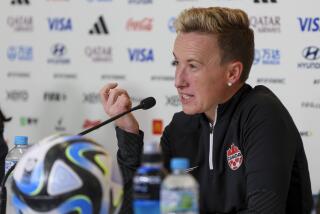In Sydney, They Won’t Be Putting Best Feet Forward
- Share via
There seems little point in men’s soccer any longer being included as an Olympic sport.
Absurd? On the contrary.
The Sydney 2000 Games are going to feature watered-down teams devoid of the sort of talent that would make the competition meaningful.
The reason? Europe does not regard Olympic soccer as significant and European clubs are doing everything they can to make sure their players--especially their African players--do not travel to Sydney.
The countries hardest hit by this attitude--and by FIFA’s inability or refusal to act--are defending gold medalist Nigeria and Cameroon, one of the United States’ three first-round opponents.
Take, for instance, the case of Nwankwo Kanu, Nigeria’s captain who led the team to a 3-2 victory over Argentina in the final at the 1996 Atlanta Games.
“I have played at the Olympics before and would love to play there again,” Kanu told an English newspaper in mid-July.
By Monday, however, Kanu, who plays for English Premier League leader Arsenal, had written to the Nigerian soccer federation asking to be dropped from the Olympic team.
“He wrote to us last week, saying he would not be available for the Games,” said Tijani Yusuff, federation general secretary, adding that Kanu had cited “pressing club engagements” as the reason for his withdrawal.
Arsenal has been pressuring Kanu to skip the Olympics because he would miss as many as five Premier League games and three European Champions’ League games.
The story is being repeated elsewhere:
* Nantes, of the French first division, has persuaded 19-year-old midfielder Salomon Olembe of Cameroon not to go to Australia.
“Because of the number of important matches the club will be playing in September, and its ambitions, the club asked Olembe to reflect on his participation in the Olympic Games,” Nantes President Kleber Bobin said.
* St Etienne, another French club, said defender Lucien Mettomo, 23, is injured and will not be available to Cameroon.
* Liverpool Coach Gerard Houllier is refusing to release Rigobert Song to Cameroon, again citing the English club’s Premier League schedule.
“Song wants to play in the Olympics,” Jean-Paul Akono, Cameroon’s coach, said Tuesday. “We’ve appealed to the Cameroon federation to appeal in turn to FIFA. Meanwhile, we’ll do what we can with the players we have.”
* Middlesborough has persuaded another Cameroon standout, Joseph Desire Job, to put the English club before his country and skip the Games.
* VfL Wolfsburg of the German Bundesliga has said it will not allow Nigerian striker Jonathan Akpoborie to go to the Olympics.
“I know how important it is for Jonny to play for his country, but I think it would be better if he ended his international career,” Wolfsburg Coach Wolfgang Wolf said last month.
* Leeds United in England is battling with Australia over the release of forward Mark Viduka.
“It’s very important for me to play at home in the Sydney Olympics,” Viduka said. “I would like to play, but as yet I haven’t discussed it with [Leeds Coach] David O’Leary.”
He won’t need to. Australia has demanded that Leeds release Viduka, even if it means he will miss significant Premier League and Champions League games.
“We are just complying with FIFA rules and will continue to do so,” said David Woolley, Soccer Australia’s chief executive.
According to a Reuters report, FIFA asked the 16 countries that qualified for the Olympic Games not to select players older than 23, even though Olympic rules permit the selection of three “over-age” players.
The Czech Republic, Italy, Spain, Slovakia, Brazil and South Africa all complied. Some, such as Spain, went even further, purposely not selecting top-level players, even though they were within the under-23 age limit.
“Nobody [selects big-name players] in Europe, they always bring their young kids,” said Lothar Osiander, who coached the U.S. at the Olympics in Seoul in 1988 and Barcelona in 1992. “They don’t care what the result is, they just want to give their [young] players [international] experience.”
Other countries, such as Japan and the United States, are fielding over-age players.
The combination of countries not willing to send their best players and clubs not willing to release players means the Sydney 2000 Olympics will not offer as appetizing a tournament as it could.
FIFA and the International Olympic Committee have long battled on this point, the IOC wanting to see the Games open to all players and FIFA arguing that this would devalue its quadrennial World Cup.
In effect, however, it would bring about a situation that Joseph “Sepp” Blatter, FIFA’s president, has himself proposed: a World Cup every two years.
If the IOC ever got its way, the chorus of complaints from clubs--who after all pay the players’ salaries--would be monumental.
The best solution would be to take men’s soccer out of the Olympics altogether and have FIFA stage a separate under-23 world championship in Olympic years to go along with its under-17 and under-20 world championships.
That way, Olympic soccer would be left to the women, where there are no such complications and fans are guaranteed of seeing the best players in the world.
More to Read
Go beyond the scoreboard
Get the latest on L.A.'s teams in the daily Sports Report newsletter.
You may occasionally receive promotional content from the Los Angeles Times.






